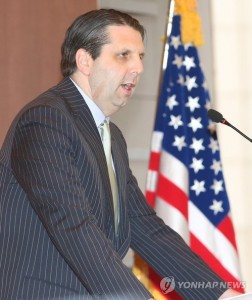- California Assembly OKs highest minimum wage in nation
- S. Korea unveils first graphic cigarette warnings
- US joins with South Korea, Japan in bid to deter North Korea
- LPGA golfer Chun In-gee finally back in action
- S. Korea won’t be top seed in final World Cup qualification round
- US men’s soccer misses 2nd straight Olympics
- US back on track in qualifying with 4-0 win over Guatemala
- High-intensity workout injuries spawn cottage industry
- CDC expands range of Zika mosquitoes into parts of Northeast
- Who knew? ‘The Walking Dead’ is helping families connect
US to keep pressing N. Korea amid Iran deal: US envoy

U.S. Ambassador to South Korea Mark Lippert speaks during a defense forum, organized by the state-run Korea Institute for Defense Analyses, at a Seoul hotel. (Yonhap)
SEOUL, July 16 (Yonhap) — The United States will continue efforts to beef up military deterrence and economic sanctions on North Korea for its weapons of mass destruction program as long as it refuses to return to the bargaining table, the top American envoy here said Thursday.
Amb. Mark Lippert reaffirmed Washington’s firm stance amid significant progress in efforts to deal with Iran and Cuba.
U.S. President Barack Obama is deeply committed to international diplomacy to solve international issues including North Korea’s nuclear weapons program, Lippert said referring to the U.S.’ recent diplomatic breakthroughs with Cuba, Iran and Myanmar.
“But I think the key difference between those three cases and North Korea is the lack of interest in coming to the table and talking seriously about denuclearization and rolling back its missile programs,” the U.S. envoy said in a speech given to a meeting of Seoul National University alumni in Seoul.
The communist country has so far only rejected the U.S.’ signal for dialogue, refusing to return to the six-party denuclearization talks or inter-Korean talks, canceling leader Kim Jong-un’s trip to Moscow and aggravating its relations with China, he said.
“We were met with more silence and unwillingness to come back to the table (from North Korea),” Lippert noted.
The U.S. policy is built on principled diplomacy, “not appeasement,” and the U.S. will continue to effectuate the harder-line approach until the North has seriousness of purpose, he said.
The alliance with Seoul as deterrence, economic sanctions and international diplomacy against North Korea’s nuclear programs were cited as three major elements of the principled approach.
“In this case the ball is in the North Korean court,” Lippert highlighted, calling for the communist country to come back to the negotiating table. Any type of dialogue is possible, he added.
“Our principal hope is that North Koreans will agree to come back to the table … we are less concerned about the platform or less concerned about the process,” according to Lippert. “We are interested in coming back to the table and exercising the principled diplomacy to roll back and get back to serious, incredible and authentic negotiations toward the denuclearization of the Korean Peninsula.”















